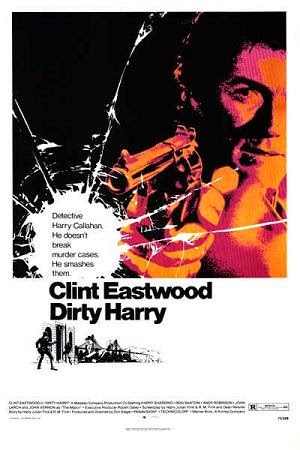“Do I feel lucky?
Well do you punk?” You know a movie is iconic when one of its lines of dialogue
still sounds just as badass over 40 years later. Dirty Harry (1971), directed by Don Siegel, cemented Clint
Eastwood’s status as a movie star after he had conquered the Western genre in
the 1960s with Sergio Leone. As San Francisco Detective Harry Callahan he plays
somewhat of a modern gunslinger, taking out bad guys with a .44 magnum
revolver, and often working outside the bounds of the law in the process. He
may not be a model for real-life cop, but Callahan served as the template for
hard-boiled cops for decades to come.
Eastwood’s
characterization and dialogue from the film has been so ingrained in pop
culture I had a rough idea of who Harry Callahan was long before ever seeing Dirty Harry. Jim Carrey parodies the
“feel lucky” speech in The Mask (1993)
and in the 90s I would watch the Lethal
Weapon movies, which essentially had Mel Gibson playing a modern-day Harry
Callahan. Then during a family vacation in Italy I watched the ending of the
movie when it was playing on TV, because of course Eastwood is big in Italy, and
yes that speech is just as badass in Italian even if you don’t understand every
word. I got to fill in the blanks when I received the whole Dirty Harry movie
collection one Christmas. Added bonus: it comes with a replica of his badge.
Sadly, no .44 magnum included.
The explanation
for Harry’s nickname is a point of contention throughout much of the movie, but
the implication is not that he is a dirty cop despite the many times he breaks the
law. In all fairness the man he is pursuing, a crazed sniper who goes by the
name Scorpio (Andy Robinson), is quite the despicable and slimy criminal.
Murdering a woman in her swimming pool by shooting her from a skyscraper in a
beautiful opening shot, he then threatens to drop more bodies unless city hall
pays him a ransom. When the police make his plans more difficult by deploying
cops on the roofs and patrolling the skies with helicopters, he kidnaps a girl
and buries her alive in a box asking for more money.
In order to catch
his prey Harry initially works much like any police detective, which is to say
by finding evidence and going on long stakeouts with his partner Gonzalez (Reni
Santoni). However when Scorpio kidnaps the girl and seriously wounds his
partner during a money drop, Harry does whatever it takes to make Scorpio
reveal the location of the girl before her air runs out, even if that means
torturing. The scene where a district attorney (Josef Sommer) tells Harry
everything he did wrong and why they have to let Scorpio go is both frustrating
and slightly amusing. From not having a warrant to not reading Scorpio his
rights, Harry made a bunch of mistakes every cop out of the academy should not
know, but in his black and white mind he did it all for the victim so he is
justified. Who cares about the rights of the killer?
If you only watch
the first movie in the series, Harry can be seen as somewhat of a fascist as he
dispenses his brand of justice with his revolver while finishing his hot-dog.
However the first sequel, Magnum Force
(1973), has him squaring off against a rogue group of police officers who are
not content with violating criminals’ civil rights, but would much rather break
into their homes and murder them. That is a line Harry will not cross.
The political
pendulum would keep swinging until the last entry in the franchise, The Dead Pool (1988). That sequel
somewhat veered into self-parody, but had a role for Liam Neeson who would
become yet another incarnation of Dirty Harry later in his career as Bryan
Mills, he of the special set of skills. Like many actors portraying tough men
doing bad things for the right reasons, Neeson owes a great deal to Eastwood
for asking one simple question with the right tone and the right pistol: “Do I
feel lucky?”

Comments
Post a Comment